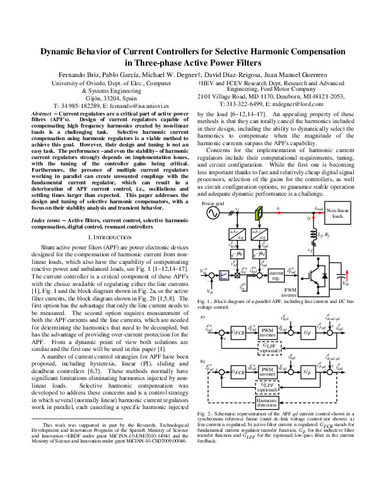Dynamic behavior of current controllers for selective harmonic compensation in three-phase active power filters
Fecha de publicación:
Editorial:
IEEE
Versión del editor:
Citación:
Descripción física:
Resumen:
Current regulators are a critical part of active power filters (APFs). The design of current regulators capable of compensating high-frequency harmonics created by nonlinear loads is a challenging task. Selective harmonic current compensation using harmonic regulators is a viable method to achieve this goal. However, their design and tuning is not an easy task. The performance-and even the stability-of harmonic current regulators strongly depends on implementation issues, with the tuning of the controller gains being critical. Furthermore, the presence of multiple current regulators working in parallel can create unwanted couplings with the fundamental current regulator, which can result in a deterioration of APF current control, i.e., oscillations and settling times larger than expected. This paper addresses the design and tuning of selective harmonic compensators, with a focus on their stability analysis and transient behavior
Current regulators are a critical part of active power filters (APFs). The design of current regulators capable of compensating high-frequency harmonics created by nonlinear loads is a challenging task. Selective harmonic current compensation using harmonic regulators is a viable method to achieve this goal. However, their design and tuning is not an easy task. The performance-and even the stability-of harmonic current regulators strongly depends on implementation issues, with the tuning of the controller gains being critical. Furthermore, the presence of multiple current regulators working in parallel can create unwanted couplings with the fundamental current regulator, which can result in a deterioration of APF current control, i.e., oscillations and settling times larger than expected. This paper addresses the design and tuning of selective harmonic compensators, with a focus on their stability analysis and transient behavior
ISSN:
Identificador local:
20130574
Patrocinado por:
This work was supported in part by the Research, Technological Development and Innovation Programs of the Spanish Ministry of Science and Innovation −ERDF under grant MICINN-10-ENE2010-14941 and the Ministry of Science and Innovation under grant MICINN-10-CSD2009-00046
Colecciones
Ficheros en el ítem




